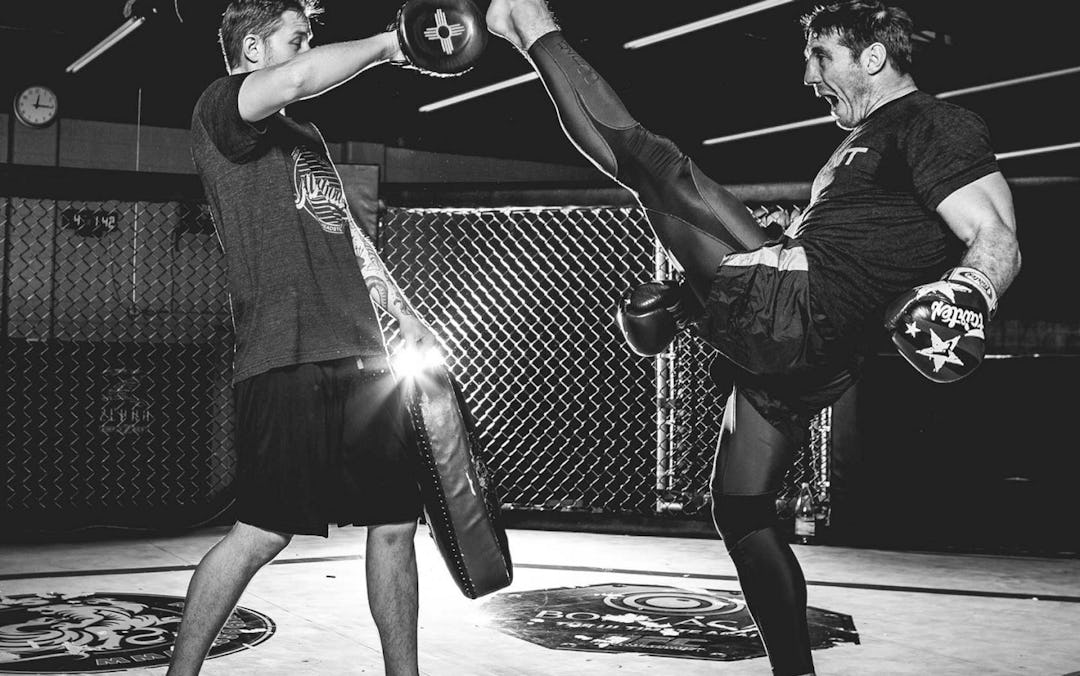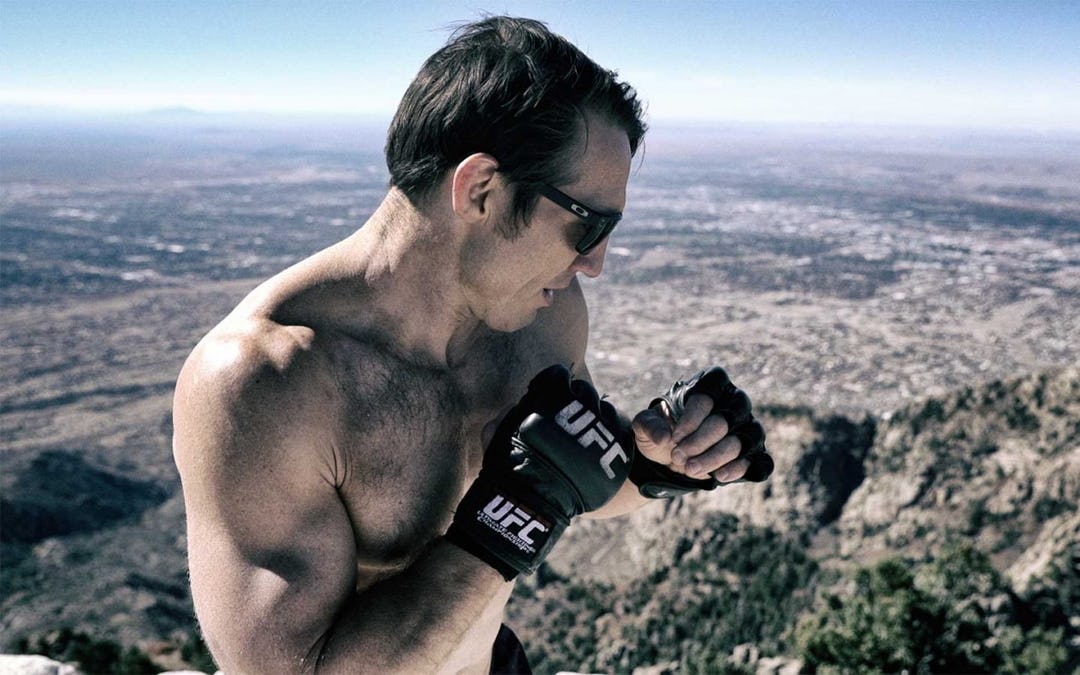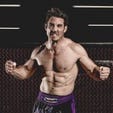Tim Kennedy fights terrorists around the world, and elite martial artists inside the UFC Octagon. The way he sees it, the least you can do is get in shape.
Tim Kennedy doesn’t expect you to enlist in the Army like he did—the day after 9/11. He’s not asking you to work out three times a day like he does, or fight inside a cage for a living. He wouldn’t blame you if you quit during Green Beret selection (as many as 70% of the tryouts do), or if you missed a sniper shot at 2,000 yards because you haven’t eaten in days, ants are crawling up your leg, your clothes are soaked, and you have sunscreen in your eyes.
But he’ll be damned if you’re going to skip a workout and then bitch about how you can’t lose weight.
A Tale of Two Tims

Kennedy, an Austin native, lives a life marked by extreme contrasts. He’s a warrior in every sense of the word, and a devoted family man who doesn’t care if his kids grow up to crochet for a living. Kennedy is an all-American boy who loves his freedom but never hesitates to give it up so that others can have theirs. And if there’s one thing that pisses him off, it’s people who don’t appreciate it.
“Tim holds himself to such a high standard that he takes it personally when other people make excuses,” says Tommy Shane Steiner, a friend. “If he senses you’re full of shit, he’ll hammer you about it.”
For the record, you don’t want to be the nail during a Tim Kennedy hammering. Kennedy has been competing in mixed martial arts (MMA) professionally since 2001, before he had an attack of conscience and joined the Army. At 37, he’s still a top contender in the UFC’s middleweight division and owns big wins over stars like Robbie Lawler and (as of press time) current middleweight champ Michael Bisping. While he fights at 185 pounds, he walks around at a dense 220, with lats thicker than tenderloin steaks.
“I’m sure some of the opponents he beat say to themselves, ‘If I had a knife, I could get him,’” says Steiner. “But Tim teaches weapons classes. ‘Well, if I had a gun, maybe.’ Nope. He’s one of the best gunfighters alive. All of the training he does is to become the hardest person anyone ever tries to kill. When you hear some of the stories he has from war, being in a fistfight… Well, I don’t imagine that even gets his heart rate up.”
“If you’re sitting on the couch drinking alcohol and not exercising, then you say you’re struggling with depression because of things that happened to you in war, I’m going to tell you to go fuck yourself. Because you’re not doing anything to improve your situation.”
Kennedy’s ability to keep perspective has made all the difference in his life. Racing to his local Army recruitment office immediately after the 9/11 attacks was his way of atoning for what he calls the narcissism that was leading him down a much different—yet probably easier—life path. “I was a good-looking guy who got straight A’s, had money, and was a professional fighter who could do whatever he wanted. But I wasn’t doing anything for anyone else, and that echoed in my mind.”
Watching the planes hit the towers, he says, prompted deeper questions about what his purpose was in life, and the answer wasn’t to be a playboy athlete. “I know that there’s something better and more important out there. I know that there’s evil, and people starving and hurting. It’s not that I was feeling guilty. I felt awake.”
Surrounded by other like-minded and highly competitive people, Kennedy flourished in the Army, qualifying for the elite Rangers division and ultimately earning the distinction of Green Beret in 2005, where he settled into a role as a sniper. He served in Afghanistan and Iraq, and is now part of the Special Forces wing of the Texas National Guard. He can be called overseas again at any time.
Kennedy isn’t shy to talk about what he saw in combat. Yes, he’s killed people, and though he has his moments, he’s mostly been able to keep dark visions of the past in the past. “When I ask people what would you have done, everybody agrees they’d do the same things, but that doesn’t make it right or any less horrible.” Kennedy justifies it all as part of his job, and if guilt or depression were to impact his ability to perform, making him hesitate for even a fraction of a second during moments of life and death, he’d let down his team, his family, and his country—which Kennedy finds infinitely more frightening than losing his own life. Incidentally, those are the only things he finds frightening.
“So while it might be horrible for me on a personal level, ultimately it is what I have chosen and dedicated my life to doing. That’s being hard to kill and stopping people from doing evil.”
Army Strong

His family, his passion, and his iron constitution may be upholding Kennedy from the depths of post-traumatic stress disorder, a condition so many returning veterans seem to be mired in. Some argue, however, that just because he’s got his mind right, he can’t expect everyone else to as well. Kennedy’s critics charge that he’s unsympathetic to other soldiers who don’t have the ability to return to civilian life with a clear head. Last fall, he incited controversy on social media with a Facebook post calling for PTSD-suffering vets to take charge of their own recovery. Putting it bluntly, he said that the key to feeling better is to “stop being a pussy.”
Kennedy doesn’t feel the statement needs clarifying. “You have to make the choice to change,” says Kennedy. “If you’re sitting on the couch drinking alcohol and not exercising, then you say you’re struggling with depression because of things that happened to you in war, I’m going to tell you to go fuck yourself. Because you’re not doing anything to improve your situation.” And it doesn’t just apply to stricken vets, but to anyone who floundering in life and unwilling to take responsibility for it.
“Get off your ass, go to the gym, start eating healthy, start having sex with your wife, go to bed early, and don’t drink alcohol. Then everything else starts getting easier. But if you want to sit there and complain and not make any change, you’re going to suffer for the rest of your life.”
Sound easier said than done? Kennedy says the secret to discipline starts with making the simple choice to change. “You have to decide to not be mediocre.” Then you make small intelligent decisions that add up over time. “No, I’m not going to go out Friday to a strip club. I’m going to call it early so I can get up early and work out. Do I really need to get a Coke to go with my dinner? That’s an easy decision to make but it’s significant. Next thing you know, you’re six percent body fat and can deadlift 500 pounds on a normal day.”
“And I like that being American gives you the freedom to practice Islam or whatever you want. If somebody isn’t for barbecue and bourbon and having a wife with big, beautiful breasts, I 100% want to support them with that.”
Another key to staying the course: recognizing that the best things in life are on the other side of hardship. Kennedy disdains what he sees as modern society’s aversion to physical struggle. He withstands the discomfort, or even pain, that comes with his duties not by blocking it out but embracing it fully.
“You stay in the moment. I enjoy the suffering because I know the yin to the yang will be even better if I embrace it now.” When he’s getting hurt, he wants to feel the hurt. “So when something feels good I can be in that moment. I know the difference because I know what pain feels like. I know what scars from shrapnel feel like. I know what scars from getting hit in a ring feel like. It makes everything else sweeter.” Appreciating the bad times, he says, make his wife smell sweeter when he gets home, and hugs from his kids feel more loving. “Who wants to live in lukewarm water or have Cheerios every day? If you don’t appreciate the contrasts, you’re not self-aware.”
Tommy Shane Steiner is a walking testimonial to Kennedy’s special brand of motivation. A country musician who had a hit with 2001’s “Maybe She’s An Angel,” Steiner says that when he retired from the music industry he let himself go physically. In 2013, he met Kennedy in an Austin gym and was floored by the intensity of the Green Beret’s workout. When Kennedy challenged him to join in, Steiner sheepishly agreed.
“The first day with Tim we did a Rooney complex,” says Steiner. “You put 135 pounds on the bar and you do one deadlift, row, clean, push press, and front squat.” Then you perform two reps of each, then three, and so on up to 10 and back down to one again. “I thought I was going to die. It took me an entire week to recover.”
But Steiner didn’t quit. These days, he trains with Kennedy up to three times a day, six days a week, and has even fallen in love with Brazilian jiu-jitsu through Kennedy (who holds a black belt). “He’s a contagious kind of guy. You end up doing all the stuff that he’s doing.” Plus, he makes you want to be better at everything.
“I really wish that I had known him years ago,” says Steiner. “The main reason I got out of music was because I thought I was good enough. I had stopped practicing and trying to be better. If I had known him before, I probably would be selling millions of records now [laughs].”
Free Man

For as hard as Kennedy is, he doesn’t hide his soft side either. “He’s so genuinely nice,” says Steiner. “I’ve never seen him be rude to a fan or to a waiter. He’ll give you the shirt off his back.”
Kennedy’s wife, Ginger, says he never brings his work home with him. “He’s amazing at compartmentalizing his emotions. Whether it be dealing with our one year old’s tantrums or the dog peeing on the floor. He doesn’t get angry at things that would set most people off.”
On top of that, Mrs. Kennedy says her husband is a hopeless romantic, who courted her “like you see in movies.” They met at Fort Bragg in North Carolina, when she was working for a defense contractor, but she was so disinterested initially, she doesn’t even remember shaking hands with him for the first time. In true military fashion, Kennedy strategized how he would win her heart as if he were planning the occupation of a foreign city.
“He says he tried to talk to me a few different times and I blew him off,” says Ginger. “Eventually he asked my friend to get me to go to dinner with them one night, and then he asked her not to come so it would just be the two of us. He turned it into a date. He asked me out the next night after that and we dated every night thereafter—except when he was deployed—until we got married.” The Kennedy’s celebrated their 10th anniversary this past year.
Hearing about what a sweetheart Kennedy is almost makes you forget the damage he can do when he has to, which has earned him a spot on the terrorist group Isis’ hit list. The FBI has visited the Kennedy home several times in the past year to warn him of the threats that extremists have made against his family—a predicament that Kennedy can’t help but smile about.
“The first day with Tim we did a Rooney complex,” says Steiner. “You put 135 pounds on the bar and you do one deadlift, row, clean, push press, and front squat.” Then you perform two reps of each, then three, and so on up to 10 and back down to one again. “I thought I was going to die. It took me an entire week to recover.”
“There’s nobody on the planet that’s going to catch that guy unaware,” says Steiner. “The funny thing is, if Tim wasn’t on the Isis hit list, he’d be upset. They were sending him tweets of pictures of beheaded soldiers and saying, ‘This is what we’re going to do to you.’ He was walking around like, ‘Hey, look at this! Isis says they’re going to behead me.’ He takes the threat seriously; he just isn’t scared.”
Kennedy is not a machine. Though his chosen occupations and regimented lifestyle may make it seem that he has little in common with the average American male, he says that identifying with him is part of what makes Kennedy want to fight the war on terror. “I’m the embodiment of everything [radical Islam] hates,” he says. “I’m an infidel. I like my wife wearing a bikini. I drink bourbon. I enjoy barbecue. And I like that being American gives you the freedom to practice Islam or whatever you want. If somebody isn’t for barbecue and bourbon and having a wife with big, beautiful breasts, I 100% want to support them with that.”
To Steiner, Kennedy is one of the last true American heroes. A real-life GI Joe that’s true to his word and leads by example, not brute force. He says that Kennedy’s drive is so addictive that it almost inspires a lemming-like devotion regardless of the circumstances. He likens it to the old Momism, “if your friends jumped off a cliff, would you do it too?”
“If Tim Kennedy jumped off a cliff,” says Steiner, “I would be a step behind him. Why? Because I’d have faith that Tim knew why.”
Tim Kennedy faces Kelvin Gastelum at UFC 206 on Saturday, Dec. 10, only on pay-per-view.

)






